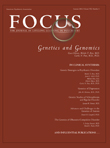From the Guest Editors
This issue of FOCUS explores recent developments in psychiatric genetics and genomics. It both introduces the reader to the advances in psychiatric genomics and helps guide the practitioner by explaining the methods and terms used in this field of research. The complexity of the genetics of psychiatric disorders presents a challenge. However, rapid technological advances continue to make this field of research one with a great potential to help us understand risk, etiology, and potential new treatments.
Original articles in this issue address the genetic components of autism spectrum disorders, schizophrenia, bipolar disorder, and obsessive-compulsive disorder. These articles discuss both the advances in the field and challenges being met across the field. Daniel Campbell discusses the technological and methodological advances in autism spectrum disorder research and the future directions of the field. Ayman Fanous discusses recent findings on the genetics of schizophrenia and bipolar disorder with particular attention paid to the genetic relationship between the two disorders. Jack Hettema examines current large-scale studies and genome-wide association studies and how their findings are affecting our understanding of the genetics of major depressive disorder. Further exploration into how life events and genetics interact to cause illness in some but not others should greatly increase our understanding of major depressive disorder. Evelyn Stewart and David Pauls review recent studies on the genetics of obsessive-compulsive disorder. In the past few decades, a number of linkage and candidate gene studies in obsessive-compulsive disorder have identified a variety of possible candidates with the glutamate transporter gene, SLCL1A1, the only candidate gene replicated across studies. Zemin Deng and colleagues introduce the terms and concepts of epigenetics and review recent data suggesting the influence of epigenetic alterations in schizophrenia. Jinger Hoop examines the four primary ethics issues in genetic testing: testing may predict a person's future health, it may have psychosocial consequences, it affects family members and communities, and it is a rapidly evolving field.
The complexity of genomics in psychiatric disorders presents both a challenge and a possibility for understanding both risk and etiology and for developing new and better treatments.



